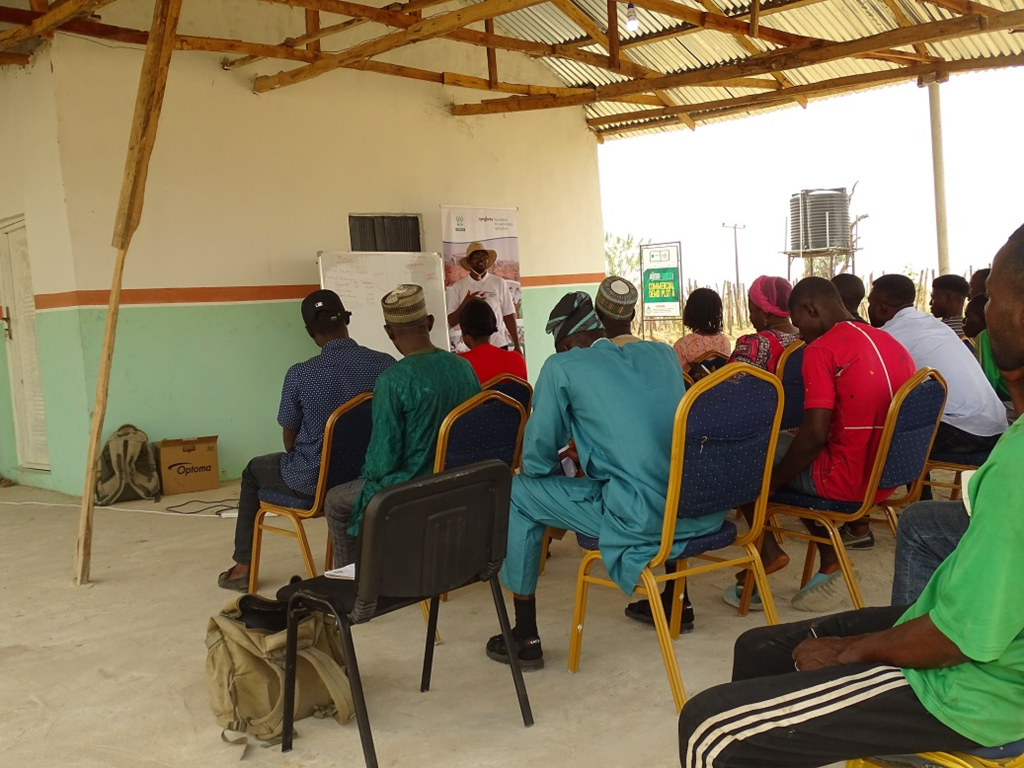In a strategic move to improve food security and promote agricultural development, Syngenta Foundation Nigeria, one of the key partners in the Dryland Crops Program (DCP), has introduced a new initiative known as the AVISA Farmers’ Hub. The initiative was launched at an event in the Murya Community of Obi Local Government Area in the Nasarawa State of North Central Nigeria. The Farmers’ Hub aims to support and empower farmers in the region, contributing to the overall objectives of the DCP.
The introduction of the Farmers’ Hub comes at a time when smallholder farmers in the region are grappling with limited access to essential resources such as knowledge, high-quality inputs, modern technology, and reliable markets, all of which are critical for achieving high-quality agricultural productivity.
A farmers’ hub (FH) is an all-inclusive commercial platform that provides diverse inputs such as seeds, seedlings, fertilizers, and crop protection products, as well as price and weather information. In addition, it provides farmers with value-added services such as aggregation, cleaning, sorting and grading of produce, bulk sales, training, equipment leasing and rental, financing, and trade credit. Smallholder farmers can now take advantage of the opportunities provided by the Farmers’ Hub by transitioning from subsistence agriculture to a commercially oriented system.

During the event, the Country Program Manager of Syngenta Foundation Nigeria, Isaiah Gabriel, emphasized the foundation’s dedication to commercializing AVISA crops: “The foundation is working to facilitate the commercialization of cowpea, sorghum, groundnuts, and pear millet.” Gabriel also emphasized the importance of raising awareness among farmers and establishing a platform that provides smallholder farmers with improved seeds, seedlings, fertilizers, mechanization, and other value-added services. He urged farmers in the state to maximize their utilization of the Farmers’ Hub and its services, which are intended to facilitate improved seed production and service delivery.
The Farmers’ Hub was established with the goal of resolving access issues, optimizing yields, aggregating grains, and overcoming market challenges. Finally, the hub hopes to improve food security and increase the income of smallholder farmers.
Prof. Mary Yeye, the National Coordinator of AVISA, commended the initiative and emphasized the importance to farmers of taking advantage of the project and making prudent use of its resources as she addressed the participants.
Experts in attendance, that included Prof. Lucky Omoigui, a seed system specialist from the International Institute of Tropical Agriculture (IITA), Prof. SG Gaya, a groundnut breeder from Bayero University Kano (BUK), and Prof, Alhassan Lalihu from the Federal University Lafia, discussed several of the obstacles to high agricultural productivity. These factors include restricted access to improved seeds, expensive fertilizers, and security concerns. The experts lauded the Farmers’ Hub as the final step in delivering resources to smallholder farmers. In addition, they urged all levels of government to intensify efforts to subsidize input costs and improve farmers’ security.
The program manager of the Nasarawa State Agricultural Development Program, Emmanuel Alanama, responded by thanking Syngenta Foundation for selecting Nasarawa State for this significant project. He acknowledged that 75 to 80 percent of the state’s population are farmers and expressed the willingness of the state government to collaborate and support any agricultural initiatives.

Rowland Alaku, manager of the Farmers’ Hub, assured farmers that they would have guaranteed access to quality seeds. The farmers in attendance expressed their gratitude for the initiative and promised to utilize the hub fully in order to benefit their own farming endeavors.
Other dignitaries in attendance included Prof. Johnson Onyibe from Ahmadu Bello University (ABU), Zaria; Dr. Teryima Iorlamen from the University of Agriculture, Makurdi; and several village heads. More than 150 farmers, stakeholders, and government officials attended the event, highlighting its importance.

 Climate adaptation and mitigation
Climate adaptation and mitigation